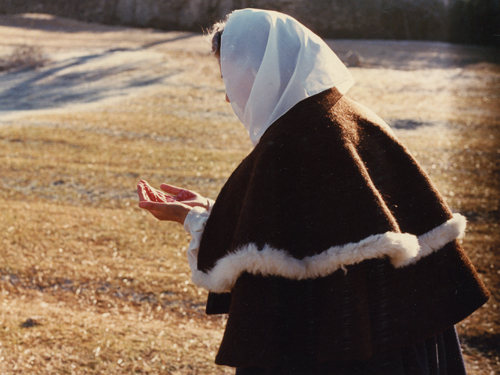Ana (António Reis & Margarida Cordeiro, 1982)

In the context of the release of the publication In the Midst of the End of the World: António Reis and Margarida Cordeiro (2024), Sabzian and Courtisane present Ana (1982), the second feature by António Reis and Margarida Cordeiro, in a new digital version by the Cinemateca Portuguesa. The screening takes place on April 3rd during the Courtisane Festival. The publication is still available for order here.
António Reis and Margarida Cordeiro created one of the most singular bodies of work in the history of Portuguese cinema, deeply influencing its development. Made between 1974 and 1989, their films deal with rural communities, rituals, and landscapes, blending reality, fiction, ethnography and poetry into a lyrical evocation of the northeastern Portuguese region of Trás-os-Montes, known for its cultural, natural, and political specificities.
Ana (1982) is their second feature film set in Trás-os-Montes. The narrative revolves around Ana, portrayed by Cordeiro's mother, Ana Maria Martins Guerra, who embodies a serene matriarch deeply connected to her surroundings. The film deals with transhistoricity and the eternal return, capturing a primordial world and the lost unity between humans and nature. The name “Ana,” a palindrome, reflects the film's circular structure, symbolizing the cyclical journey through birth, life, and death. Additionally, Ana is the name of the directors' daughter, who appears in the film as a toddler. The film's minimal dialogue, inspired by Rainer Maria Rilke’s poetry, underscores a deeper, non-verbal communication between generations and the land they inhabit. Ana stands as a meditation on history, human civilization, and the individual's role within the vast expanse of time.
“A film by poets, but also by geologists, anthropologists, sociologists, by all the possible ‘logists’. Reis and Cordeiro are Portuguese, but not from Lisbon (it is a much too provincial capital city), not even from Porto. They situate their films in this north of Portugal where the tourists never come (they invade the Algarve in hordes, the fools). Beautiful and abandoned landscapes, which have to be perceived as sumptuous ruins; a countryside that is filmed as if it were a city. In Ana, the trees, the roads, the stones of the houses almost have names. Everything is a junction; nothing is anonymous. The film is a consoling buzzing: the sound of the wind causes the images to swell and flow back like a sea. There is emptiness in the midst of these sensations, the way there is an emptiness in this part of Portugal. The films by Reis and Cordeiro record a disorienting situation of emigration, caused by the exodus: the men have left, the children are now left to their games and the elderly are left to guard the places. There is no supervision from the parents here, only the guardianship of grandparents, in a game of glances, fleeting and tender, surprised and serious.”
– Serge Daney


